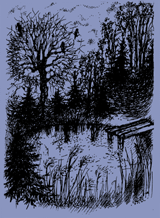At the beginning of 2008 the translation of the book "Guests of Eternity" got The Britain’s Poetry Book Society Recommendation.
GUESTS OF ETERNITY, Larissa Miller, translated by Richard McKane
Arc Publications 2008 ISBN 978 1904614 06 7/88 3
selected by Ruth Fainlight
Of the Russian poet Larissa Miller, whose poems he has translated so beautifully, Richard McKane writes: “She is a poet for all seasons, a nature poet, but also a poet for all seasons of the soul.” And in her thoughtful introduction to this selection from many years’ work (much of which Miller could not have imagined would ever be published), Sasha Dugdale notes:
“In Russia, poetry has long been viewed as a terrible but distinguished burden .... Part of the poet’s spiritual burden is the duty not to stand apart from society and prophesy.” The more political poems from the ’70s and ’80s comment openly on the horrors of the Soviet system, but even at such a time Miller could write:
The snow sparkled even in the black years,
the meadows were bright even in the black years,
the spring birds sang,
the vernal passions boiled.
When they led away the innocent under guard
the cherry trees were blossoming tenderly,
the waters of the lakes rippled
in those black, black years.
For a schoolgirl growing up in Moscow, adding to the harshness of the immediate post-war years was the endemic Russian anti-Semitism. But like Pasternak (and Simone Weil), Miller shares that particular Jewish admiration for Christianity which sees it as an advance towards mercy and charity, away from Jehovah’s stern vengeance. And she was fortunate in having a supportive family: a beloved mother, and a happy marriage. About her son, she wrote:
My child, the justification of my confusion ...
I thank you warmly. You allowed me, the rebel,
to be your mother, tiresome and tender.
There are also the poems which every poet writes, no matter from what era or country, about the actual process of writing. Miller’s use of language and form are highly praised. She has fine things to say on the joys and anguish of creation, and her exalted, quivering tone sometimes makes me think of Rilke, and his angels of inspiration.
Don’t scare off, don’t scare off, go forward cautiously,
even if you can’t control yourself,
when the little angel on white wings –
here’s one more beat and one more beat –
flies down from the heavens and sits among us,
touching the earth with unearthly wings.
Throughout the volume, one finds simple wise poems which record, and celebrate, the development of a soul through the one of the worst times of Russian history. That this could happen – and continues to happen under repressive regimes in different parts of the world today – is indeed ‘the secret reason of life’.
To go out once from fate
as from a heated hut
people go out into the cold porch
where things, shaky as shadows,
stand, where a voice is more muffled,
where the wind and forest are more audible,
where there is the black abyss of night,
and the secret reason of life.
